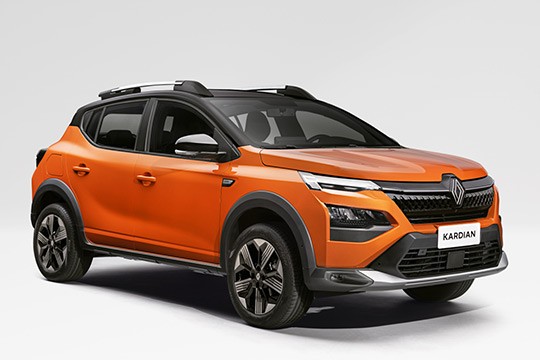RENAULT Kardian Models/Series Timeline, Specifications & Photos
First production year: 2023
Engines: Gasoline
Body style: SUV (Sports Utility Vehicle)
In late 2023, Renault unveiled a new model for the South American market: the Kardian. It was a B-segment crossover built on a new platform that offered a stylish look for its segment, augmented by newly developed engines.
The French automaker had a strong presence in the South American continent and pushed its R&D department to create a vehicle able to lead the B-segment. As a result, in 2023, Renault introduced the Kardian as an alternative to similar vehicles, combining a short overall length with higher ground clearance and a spacious cabin fit for five adults and some luggage with powerful enough engines and advanced safety systems. This product also served as a test bench for the new platform, which eventually was used on other Renault models.
Renault created the Kardian with its latest design language elements, such as the backlit logo that took center stage on the reversed trapezoidal grille adorned by a 3D diamond pattern. This was flanked by the headlights, which sat lower, below the LED daytime running lights. Moving lower onto the bumper, the design team created a broad second grille underlined by a plastic shield sporting an aluminum-look finish. From its profile, the car’s higher ground clearance was emphasized by the black plastic moldings around the wheel arches and the side sills. As an option, the Kardian was available with a contrasting roof, creating an image of an upscale vehicle. In addition, the automaker added LED blinkers to the door mirrors as an additional element of style and safety. Finally, at the back, the hatchback Kardian featured wider shoulders on the quarter panels. A roof spoiler adorned the slightly tilted forward tailgate at its upper side. For better visibility, Renault installed C-shaped LED taillights that flanked the tailgate and intruded into the rear panel. The bumper was divided into two horizontal areas, where the upper one was in body color while the lower was black.
Inside, the carmaker tried to emphasize the upscale look of the vehicle by adding a display inside the instrument cluster and an eight-inch touchscreen on the dashboard in a free-floating position. The center stack housed the controls for the HVAC system carried over from other European models, such as the Dacia Duster. Furthermore, the center console housed the gear selector for the automatic transmission, where fitted, and the switch for the parking brake. Fronting the driver was a three-spoke steering wheel fitted with physical buttons that accessed the commands for the infotainment unit and the car’s onboard computer. The front seats were slightly bolstered and were covered in fabric upholstery, while the rear bench seat was wide enough to accommodate three passengers, although just for short trips. But the most surprising part of the vehicle was the abundance of safety systems that Renault offered on the Kardian. It offered the car with a blind spot monitor, adaptive cruise control, and automated emergency braking. These features were not mandatory in Brazil, where Renault launched the vehicle, but played an important role in the carmaker’s philosophy about safety.
Under the hood, Renault installed an inline-three turbocharged gasoline engine that produced 125 PS (123 hp) and 220 Nm (162 lb-ft.) of torque paired to an EDC (dual-clutch) automatic transmission that drove the front wheels.
